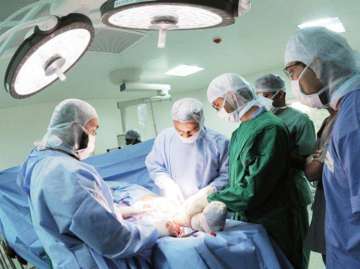Govt caps knee implants price, cuts MRP by up to 70 pc
The government has capped the maximum retail price of the keen implants, a move that it claimed will save patients an estimated Rs 1,500 crore annually.

After cardiac stents, the government today fixed a price range for knee implants from Rs 54,000 to Rs 1.14 lakh, nearly 70 per cent lower than most surgeries currently cost. With private hospitals reportedly charging exorbitant rates, the government capped the maximum retail price of the keen implants, a move that will save patients an estimated Rs 1,500 crore annually.
"Government will not remain a mute spectator and will not allow this illegal and unethical profiteering," Chemicals and Fertilisers Minister Ananth Kumar told a news briefing. The price in case of specialised implants for cancer and tumour has been sharply cut to Rs 1,13,950 from the current prices of Rs 4-9 lakh.
There are 1.5 crore to 2 crore patients who require knee implants surgery. Every year 1.2 lakh to 1.5 lakh knee surgeries takes place in India, according to the government. It is estimated by World Health Organization (WHO) that by 2020, osteoarthritis is going to be the fourth largest cause of immobility in globally, Kumar informed.
The government had in February slashed the maximum price of life-saving heart stents implants by up to 85 per cent by capping them at Rs 7,260 for bare metal ones and Rs 29,600 for drug eluting variety.
Earlier, the average maximum retail price (MRP) for BMS was Rs 45,000 and for DES, it was Rs 1.21 lakh.
Kumar said today's decision comes a day after Prime Minister Narendra Modi announced from the Red Fort on the Independence Day that prices of knee surgery would be brought down.
Earlier this month, the National Pharmaceutical Pricing Authority had stated that the average trade margin on orthopaedic knee implants were found to be as high as 313 per cent.
"After cardiac stents, we have now decided to bring all kinds of knee implants under price control. In our country 1.5 to 2 crore people suffer from knee problems, who need health assistance," Kumar said.
"The government will not be a mute spectator to illegal and unethical profiteering," he added.
"Today across the country, private hospitals have increased prices of knee implant surgeries. They are indulging in unethical profiteering. To stop this and give relief to patients, we have taken this decision," he said.
The decision has been taken keeping people's interest and health security of the nation into consideration, Kumar said.
The minister warned of stringent action against hospitals, importers, retailers if they charged in excess of the MRP saying that the government would recover excess profit from such knee implants with 18 per cent interest and may also cancel licences of hospitals.
Asked whether industry would be able to recover their costs under the new prices, the minister said: "The MRP has been fixed after taking into account the landed cost and there will be comfortable margins for the industry."
Reacting to the development, medical device industry body MTaI said MTaI is reviewing the order from NPPA.
Under the new price regime, the MRP of most widely used complete knee implant (Cobalt-Chromium) has been fixed at Rs 54,720 plus GST, a reduction of 65 per cent from earlier average MRP of Rs 1,58,324. This particular type of knee implant has around 80 per cent market share.
The new MRP of special metal titanium and oxidised zirconium has been fixed at Rs 76,600 plus GST, down 69 per cent from an average rate of Rs 2,49,251 earlier. High flexibility implant will now cost Rs 56,490 plus GST, down 69 per cent from average MRP of Rs 1,81,728 earlier.
Special metal and high flexibility knee implants account for another 17 per cent of the market.
Revision implants for second surgery, which patients normally need after 10 years, will now cost Rs 1,13,950 plus, lower by 59 per cent from average MRP of Rs 2,76,869.
Lastly, the MRP of specialised implants for cancer and tumour has been fixed at Rs 1,13,950 which used to be priced around Rs 4-9 lakh.